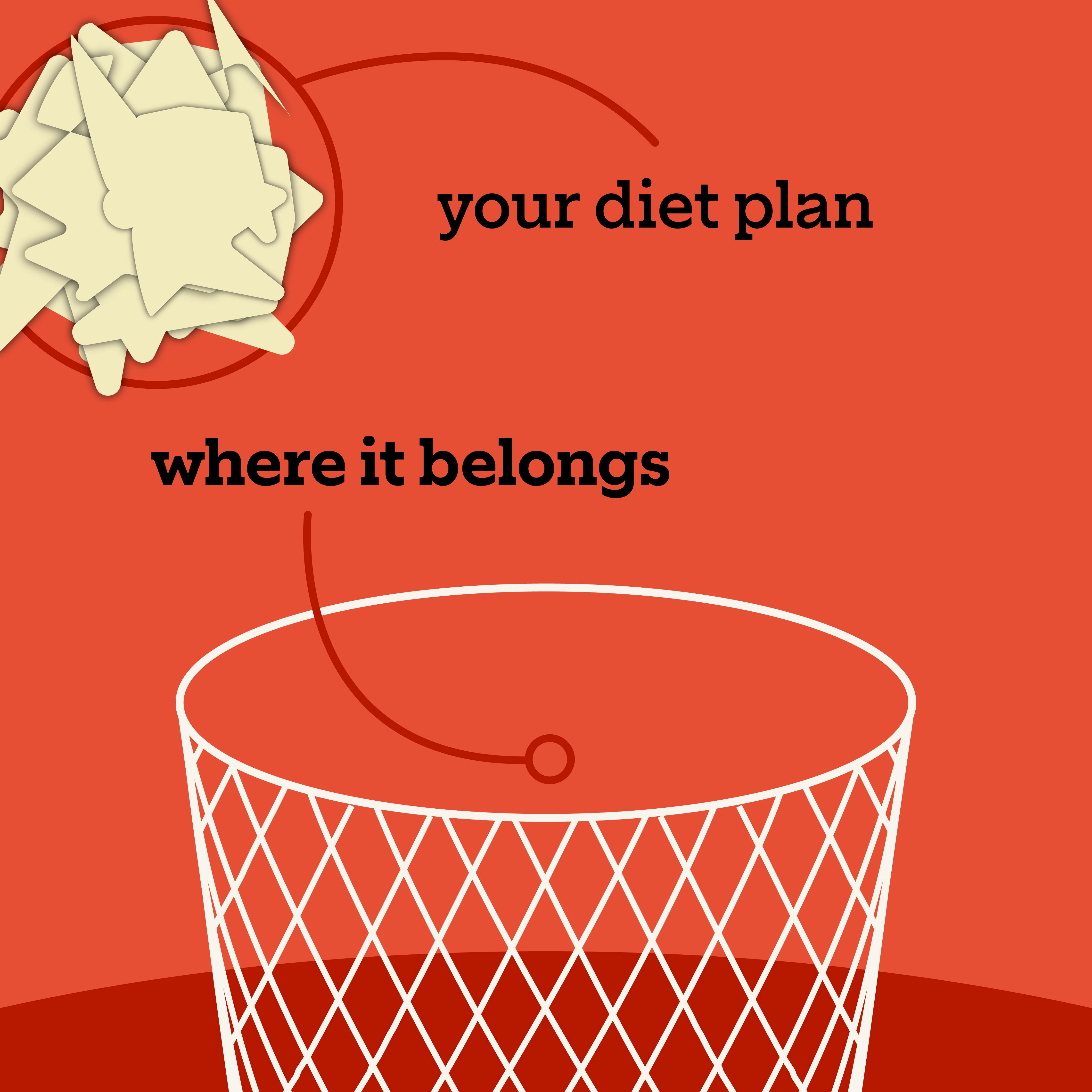
6 Reasons Why Diets Don't Work
By Danielle McAvoy, MSPH, RD
January 5, 2022
Have you ever tried to lose weight on a restrictive, short-term diet, only to gain it all back plus? No matter what diet you try, the same thing happens. Many people stuck in this cycle of yo-yo dieting blame their failure on a lack of willpower. But research shows that it’s not their fault. Dieting is not a matter of willpower.
Gaining weight after a diet is inevitable because dieting changes your biology (1). In 2020, a major study looked at 14 of the most popular diets and found that almost every person who tried them gained the weight back within 12 months (2). Other research shows that 95% of dieters regain some weight even if they keep up healthy eating and exercise habits (3). That doesn’t mean 95% of people suck at dieting. It means diets don’t work.
The sheer number of fad diets that have come and gone in the past couple of decades is only further evidence that diets are destined to fail. If Atkins, South Beach, or the next diet-of-the-moment were truly helping people lose weight for the long term, why would we continually move from one fad to the next?
Diets don’t work because they:
1. Rewire your brain. When you limit your food intake, your brain thinks that resources are scarce, and triggers you to focus on eating so you don’t starve. Dieting can lead to thinking about eating more than you normally would, making food look and smell irresistible. Your brain wants you to eat more, so it increases the dopamine reward every time you sit down for a meal. These changes in your brain mimic addiction, making it very hard to resist the thing you’re trying to resist.
2. Mess with your hormones. When your body experiences a calorie deficit, it produces more of the hunger hormone (ghrelin) and less of the fullness hormone (leptin). You may feel hungrier more often and less full when you eat. This is another tactic your body uses to encourage eating so you don’t starve. Feeling constantly hungry or never full makes it hard to eat less.
3. Slow your metabolism. If you’re suddenly taking in fewer calories, your body conserves energy by using those calories more efficiently. This means you burn fewer calories doing the same activities, so unless you continue to eat less and less food, the calories your body conserves will get stored as fat. Metabolism is hard to revive once the diet ends, which is why many people end up gaining more weight than they lost. The longer you yo-yo diet, the more stubborn your metabolism becomes.
4. Deprive you of necessary nutrients. Some diets are so restrictive that you simply can’t get all the nutrients you need from food. Nutrient deficiencies can cause food cravings, making it hard to lose weight. Because fiber helps control carbohydrate cravings, diets that restrict fruits, vegetables, and whole grains can lead to carb-loading down the road. Magnesium or zinc deficiencies may cause sugar cravings. Fatigue and irritability are other signs of nutrient deficiency that may cause you to curl up on the couch with comfort food rather than working out and sticking to a diet.
5. Aren't the only thing that determines your weight. Sleep, activity, and stress can doom any diet from the start. Poor quality sleep disrupts the hunger and fullness hormones and can cause cravings for sugary foods that provide quick energy. Not exercising, no matter what you eat, limits your metabolism. The stress hormone cortisol promotes fat storage and can sabotage any weight loss efforts.
6. Don't support long-term health. Diets are designed to be temporary because they aren’t compatible with normal life. They teach you to avoid certain food groups, eat only at certain times of day, or count calories, all temporary habits that research proves don’t work in the long run. Simple habits like eating protein at breakfast, drinking plenty of water, and chewing slowly are way more likely to become a normal part of your life.
To successfully lose weight for the long-term it’s important to eat enough real, whole foods to keep you from feeling hungry. Intuitive eating, often called the anti-diet, relies on behavioral changes that don’t trigger harmful biological changes. It emphasizes paying attention to hunger cues, eating nourishing foods, moving in a way that feels good, and enjoying all foods without guilt. There is no restricting foods or counting calories, so your brain doesn’t perceive food scarcity. Eating nutritious foods when you’re hungry and only until you are satisfied keeps hunger hormones in check. When the calorie deficit is small, your body feels safe breaking down fat for energy rather than conserving it by slowing your metabolism.
The Mediterranean Diet is one of the most well-researched and recommended methods for sustainable weight loss. It encourages daily activity, drinking moderate amounts of wine, and enjoying meals with loved ones. Like intuitive eating, the Mediterranean Diet is not restrictive and doesn’t trigger negative biological changes or result in nutrient deficiencies.
Going on a diet might result in some initial weight loss but only 5% of dieters keep the weight off. Diets don’t work because they aren’t compatible with our biology. To lose weight for good, use science to your advantage and make small, holistic changes that encourage your body to let go of excess fat.
Sources:
1. https://www.ncbi.nlm.nih.gov/pmc/articles/PMC5764193/
2. https://pubmed.ncbi.nlm.nih.gov/32238384/
If you enjoyed this article, you might also enjoy: Why BMI is BS